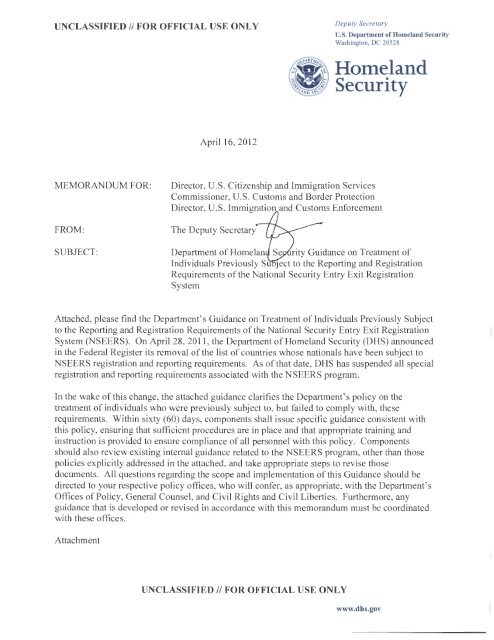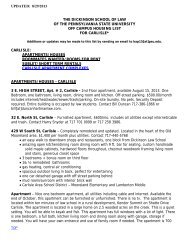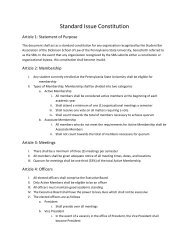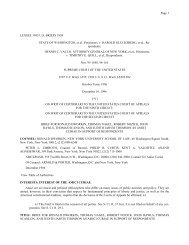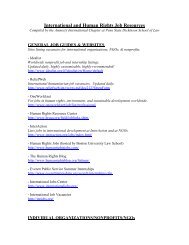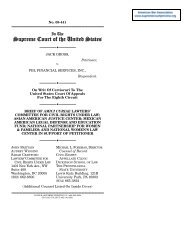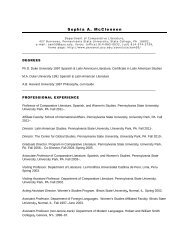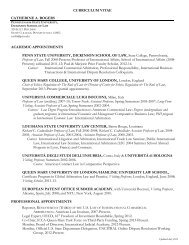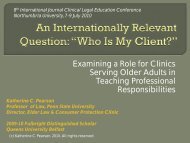Homeland Security - Penn State Law
Homeland Security - Penn State Law
Homeland Security - Penn State Law
You also want an ePaper? Increase the reach of your titles
YUMPU automatically turns print PDFs into web optimized ePapers that Google loves.
UNCLASSIFIED II FOR OFFICIAL USE ONLY<br />
Deputy Secretary<br />
U.S. Department of <strong>Homeland</strong> <strong>Security</strong><br />
Washington, DC 20528<br />
<strong>Homeland</strong><br />
<strong>Security</strong><br />
April 16,201 2<br />
MEMORANDUM FOR:<br />
FROM:<br />
SUBJECT:<br />
Director, U.S. Citizenship and Immigration Services<br />
Commissioner, U.S. Customs and Border Protection<br />
Director, U.S. Immigration and Customs Enforcement<br />
The Deputy Secretary<br />
Department of Hom elan ity Guidance on Treatment of<br />
Individuals Previously Su to the Reporting and Registration<br />
Requirements of the National <strong>Security</strong> Entry Exit Registration<br />
System<br />
Attached, please find the Department's Guidance on Treatment oflndividuals Previously Subject<br />
to the Reporting and Registration Requirements of the National <strong>Security</strong> Entry Exit Registration<br />
System (NSEERS). On April 28, 2011 , the Department of <strong>Homeland</strong> <strong>Security</strong> (DHS) announced<br />
in the Federal Register its removal of the list of countries whose nationals have been subject to<br />
NSEERS registration and reporting requirements. As of that date, DHS has suspended all special<br />
registration and reporting requirements associated with the NSEERS program.<br />
In the wake of this change, the attached guidance clarifies the Department' s policy on the<br />
treatment of individuals who were previously subject to, but failed to comply with, these<br />
requirements. Within sixty (60) days, components shall issue specific guidance consistent with<br />
this policy, ensuring that sufficient procedures are in place and that appropriate training and<br />
instruction is provided to ensure compliance of all personnel with this policy. Components<br />
should also review existing internal guidance related to the NSEERS program, other than those<br />
policies explicitly addressed in the attached, and take appropriate steps to revise those<br />
documents. All questions regarding the scope and implementation of this Guidance should be<br />
directed to your respective policy offices, who will confer, as appropriate, with the Department's<br />
Offices of Policy, General Counsel, and Civil Rights and Civil Liberties. Furthermore, any<br />
guidance that is developed or revised in accordance with this memorandum must be coordinated<br />
with these offices.<br />
Attachment<br />
UNCLASSIFIED II FOR OFFICIAL USE ONLY<br />
www.dhs.gov
UNCLASSIFIED II FOR OFFICIAL USE ONLY<br />
Department of <strong>Homeland</strong> <strong>Security</strong><br />
Guidance on the Treatment of Individuals Previously Subject to the Reporting and Registration<br />
Requirements of the National <strong>Security</strong> Entry Exit Registration System (NSEERS)<br />
Purpose<br />
On April28, 2011 , through a notice published in the Federal Register, the Department of<br />
<strong>Homeland</strong> <strong>Security</strong> (DHS) removed the list of countries whose nationals have been subject to<br />
NSEERS registration and reporting requirements. The notice also announced that DHS would<br />
no longer register aliens under the NSEERS program. It did not give guidance on how DHS<br />
Components should treat aliens' past failure to comply with special registration and reporting<br />
provisions. This memorandum provides this guidance and also clarifies that, as of<br />
April28, 2011 , DHS has suspended all special registration and reporting requirements associated<br />
with the NSEERS program. This suspension applies to all aliens previously subject to NSEERS<br />
requirements, whether or not the alien was a national of one of the previously designated<br />
countries and regardless of the underlying basis for the alien' s inclusion in the NSEERS<br />
program.<br />
Unless specifically exempted herein, this guidance applies to and is binding on all DHS<br />
personnel.<br />
Authority<br />
Applicable authority includes:<br />
• Sections 212, 214, 263, 264, and 265 of the Immigration and Nationality Act (INA),<br />
8 U.S.C. §§ 1182, 1184, 1303, 1304, and 1305;<br />
• 8 C.F.R. §§ 214.1(f) and 264.1(f); and<br />
• Department of <strong>Homeland</strong> <strong>Security</strong>, Office of the Secretary, Removing Designated<br />
Countries from the National <strong>Security</strong> Entry-Exit Registration System (NSEERS) ; Federal<br />
RegisterNol. 76, No 82/Thursday, April28, 2011.<br />
This memorandum rescinds, in whole, the following:<br />
• U.S. Immigration and Customs Enforcement (ICE), Memorandum from Victor X. Cerda,<br />
Acting Principal Legal Advisor, Changes to the National <strong>Security</strong> Entry Exit Registration<br />
System (NSEERS) (January 8, 2004);<br />
• ICE, Memorandum from John P. Clark, Director oflnvestigations, National <strong>Security</strong><br />
Entry Exit Registration System (NSEERS) Policy Update (December 10, 2003);<br />
• ICE, Memorandum from John P. Clark, Interim Director oflnvestigations, Field Agent<br />
Discretion in Compliance Enforcement (September 16, 2003); and<br />
2<br />
UNCLASSIFIED II FOR OFFICIAL USE ONLY
UNCLASSIFIED II FOR OFFICIAL USE ONLY<br />
• U.S. Immigration and Naturalization Service, Standard Operating Procedures for Aliens<br />
Subject to Special Registration, Also Known as the National <strong>Security</strong> Entry Exit<br />
Registration System (NSEERS) (September 5, 2002), as amended.<br />
This memorandum revises the U.S. Citizenship and Immigration Services (USCIS) guidance,<br />
Memorandum from William R. Yates, Acting Associate Director for Operations, Adjudication of<br />
Benefit Applications Involving NSEERS Registrants (April2, 2004), by rescinding only those<br />
portions of that memorandum that are inconsistent with the "Referral of Cases" section contained<br />
herein.<br />
Background<br />
On September 11 , 2002, the Immigration and Naturalization Service (INS) began its<br />
implementation, pursuant to INA sections 262(a) and 263(a), 8 U.S.C. §§ 1302(a) and 1303(a),<br />
of a new special registration program, NSEERS. This program was intended to provide the<br />
Federal Government with records of the arrival to, presence in, and departure from the United<br />
<strong>State</strong>s of certain nonimmigrant aliens. Aliens required to register included those nonirnmigrants:<br />
(i) who, in accordance with the requirements outlined in 8 C.F.R. § 264.1(£), were designated by<br />
Federal Register notice, and (ii) whose presence in the United <strong>State</strong>s required monitoring in the<br />
national security or law enforcement interests of the United <strong>State</strong>s. Aliens subject to NSEERS<br />
were required to be registered, photographed, and fingerprinted, provide specific information at<br />
regular intervals to ensure compliance with visa and admission requirements, and verify their<br />
departure from the United <strong>State</strong>s through designated ports of entry.<br />
On April28, 2011 , DHS announced in a Federal Register notice its removal of the list of<br />
countries whose nationals have been subject to NSEERS registration and reporting requirements<br />
(hereinafter referred to as "de-listing"). Following this notice, DHS suspended all special<br />
registration and reporting requirements associated with the NSEERS program. This suspension<br />
applies to all aliens previously subject to NSEERS requirements, whether or not the alien was a<br />
national of one of the previously designated countries and regardless of the underlying basis for<br />
the alien' s inclusion in the NSEERS program.<br />
Subsequently, as a result of DHS' s announcement, the Department of <strong>State</strong> (DOS) issued<br />
guidance to all posts to discontinue entering "NSER" and "EXMT" codes- indicating that an<br />
alien was subject to or exempt from, respectively, NSEERS registration at ports of entry<br />
(POE}-into DOS's Consular Lookout and Support System (CLASS). This cable also advised<br />
that DOS was working with other agencies to remove all such codes from the CLASS and TECS<br />
systems. DOS advises that it has completed this effort.<br />
In light ofDHS' s suspension ofthe NSEERS program, it has become necessary to clarify the<br />
limited circumstances under which negative immigration consequences, such as a denial of a<br />
benefit, finding of inadmissibility, or commencement of removal proceedings, will result from an<br />
alien's prior failure to comply with NSEERS requirements. This memorandum clarifies that<br />
noncompliance, in and of itself, is not a sufficient basis for such consequences to adhere. Rather,<br />
3<br />
UNCLASSIFIED II FOR OFFICIAL USE ONLY
UNCLASSIFIED II FOR OFFICIAL USE ONLY<br />
negative immigration consequences may apply only where DHS personnel have determined,<br />
based on the totality of the evidence, that an alien's NSEERS violation was willful.<br />
Willful Noncompliance<br />
All cases involving NSEERS violations should be carefully evaluated to determine whether there<br />
is sufficient evidence to support a finding that the alien' s failure to comply was willful. As a<br />
general matter, and solely for purposes of evaluating noncompliance with an NSEERS<br />
requirement, "willful" noncompliance will be that which was deliberate, voluntary, or<br />
intentional, as distinguished from that which was involuntary, unintentional, or otherwise<br />
reasonably excusable.<br />
A willful failure to comply with any NSEERS requirement constitutes a "failure to maintain<br />
nonimmigrant status" under INA section 237(a)(l)(C)(i), 8 U.S.C. § 1227(a)(l)(C)(i).<br />
8 C.P.R.§ 214.1(£). The recent suspension ofthe NSEERS program does not excuse such<br />
violations. Therefore, where a willful violation has occurred, DHS may still hold the alien<br />
accountable for his or her noncompliance. DHS personnel nonetheless retain prosecutorial<br />
discretion and should continue to favorably exercise that authority, as appropriate and consistent<br />
with current applicable guidance, in such cases.<br />
Conversely, where DHS personnel have determined that noncompliance was not willful, DHS<br />
should not pursue immigration enforcement action, nor deny any immigration benefit, solely on<br />
the basis of the alien's failure to comply with NSEERS requirements. In addition, such nonwillful<br />
noncompliance with NSEERS requirements will not normally trigger the (rebuttable)<br />
presumption of inadmissibility prescribed at 8 C.F .R. § 264.1 (£)(8). That section provides (in<br />
pertinent part) that, where a nonimmigrant alien previously subject to special registration<br />
requirements has failed, without good cause, to register his departure, he or she shall thereafter<br />
be presumed inadmissible under INA§ 212(a)(3)(A)(ii), 8 U.S.C. § 1182(a)(3)(A)(ii).<br />
Furthermore, where it has come to the attention of DHS personnel that an otherwise meritorious<br />
application was denied solely as a result of the alien's failure to comply with NSEERS<br />
requirements, and the alien would have been eligible for immigration relief or an immigration<br />
benefit but for the violation, DHS personnel may favorably exercise their discretion to reopen<br />
such cases for re-adjudication, consistent with this guidance. In implementing this guidance,<br />
each DHS component must determine the most appropriate mechanism by which to review cases<br />
brought to their attention.<br />
Nothing in this guidance, however, shall prevent DHS from exercising its full authorities in<br />
response to any derogatory information, including but not limited to information regarding<br />
criminal activity or other violations of immigration status unrelated to the NSEERS violation,<br />
regardless of whether the information was discovered or obtained in connection with the<br />
NSEERS program. Nor does this require DHS, on its own initiative, to reconsider all closed<br />
matters involving NSEERS violations.<br />
Evidentiary Considerations<br />
The burden of establishing that failure to comply with an NSEERS requirement was not willful<br />
rests solely with the alien, who must establish this fact by a preponderance of the evidence. The<br />
4<br />
UNCLASSIFIED II FOR OFFICIAL USE ONLY
UNCLASSIFIED II FOR OFFICIAL USE ONLY<br />
determination of what evidence is credible and the weight given to that evidence shall be within<br />
the sole discretion of DHS personnel.<br />
The determination of whether or not the noncompliance was willful will be based on the totality<br />
of the circumstances, involving a careful consideration of all factors, including but not limited to<br />
evidence in the record, statements by the individual, or other relevant information. As always,<br />
DHS personnel possess the authority to elicit and consider evidence to aid in determining<br />
whether an alien was subject to and complied with NSEERS requirements and whether any<br />
noncompliance was willful. In keeping with DHS's obligation to consider whether an alien has<br />
complied with all U.S. immigration laws when evaluating an alien's eligibility for immigration<br />
benefits, application for admission, removability, or other related matters, DHS personnel should<br />
thoroughly review the record before them and request additional information, as necessary and<br />
appropriate, to ensure a fair and proper evaluation ofNSEERS noncompliance.<br />
In making these determinations, DHS personnel should consider anew all available<br />
information, notwithstanding any finding of willfulness that predates this memorandum<br />
and the guidance set forth herein.<br />
It is important to note that a TECS lookout for an NSEERS violation, alone, does not constitute<br />
conclusive evidence of willful noncompliance. In contrast, an admission by an alien that his/her<br />
act of violating NSEERS was willful is conclusive evidence of willful noncompliance.<br />
Evidence that would support a finding that the noncompliance was not willful includes, but is not<br />
limited to:<br />
• Credible claims that the alien received inaccurate or incomplete advice by INS or DHS<br />
personnel about where to report or register;<br />
• Credible claims that the alien was in contact with INS or DHS, but INS or DHS failed to<br />
accurately advise the alien as required under the regulations;<br />
• Incapacitation of the alien (e.g., serious illness and/or hospitalization, admission into a<br />
nursing home or extended care facility where mobility is severely limited) that prevented<br />
him or her from complying;<br />
• Exceptional circumstances beyond the control ofthe alien (e.g., natural disaster, death of<br />
the spouse, child, or parent of the alien) that prevented him or her from complying; or<br />
• Any other evidence showing that the failure to appear was through no fault of the alien.<br />
Failure to comply with an NSEERS requirement based on personal inconvenience or fear of<br />
immigration consequences will not support a finding that the violation was not willful.<br />
Referral of Cases<br />
Effective immediately, USCIS will cease referring suspected NSEERS violations to ICE for<br />
assistance in determining eligibility for immigration benefits administered by USCIS.<br />
Furthermore, all cases that were previously forwarded to ICE for such purposes, but in which<br />
ICE has not issued a Notice to Appear, will be returned to USCIS for appropriate handling,<br />
consistent with this guidance. In such cases, USCIS shall assume responsibility for making the<br />
final determination as to whether an alien's past failure to comply with an NSEERS requirement<br />
5<br />
UNCLASSIFIED II FOR OFFICIAL USE ONLY
UNCLASSIFIED II FOR OFFICIAL USE ONLY<br />
was willful. If USCIS denies a case based on a finding of willful noncompliance with an<br />
NSEERS requirement, USCIS will refer the case to ICE for possible issuance of a Notice to<br />
Appear.<br />
This memorandum is intended solely for the guidance of DHS personnel in the performance of<br />
their official duties. It is does not, nor may it be relied upon to, create any substantive or<br />
procedural right or benefit that is enforceable at law or by any individual or other party in<br />
removal proceedings, in litigation with the United <strong>State</strong>s, or in any other form or manner.<br />
Furthermore, as there is no right to the favorable exercise of the Department's discretion, nothing<br />
in this memorandum should be construed to prohibit the apprehension, detention, or removal of<br />
any alien unlawfully in the United <strong>State</strong>s or to limit the Department's legal authority in any way.<br />
The guidance provided in this memorandum is effective upon signature and applies to all<br />
pending and future filings and actions.<br />
6<br />
UNCLASSIFIED II FOR OFFICIAL USE ONLY


